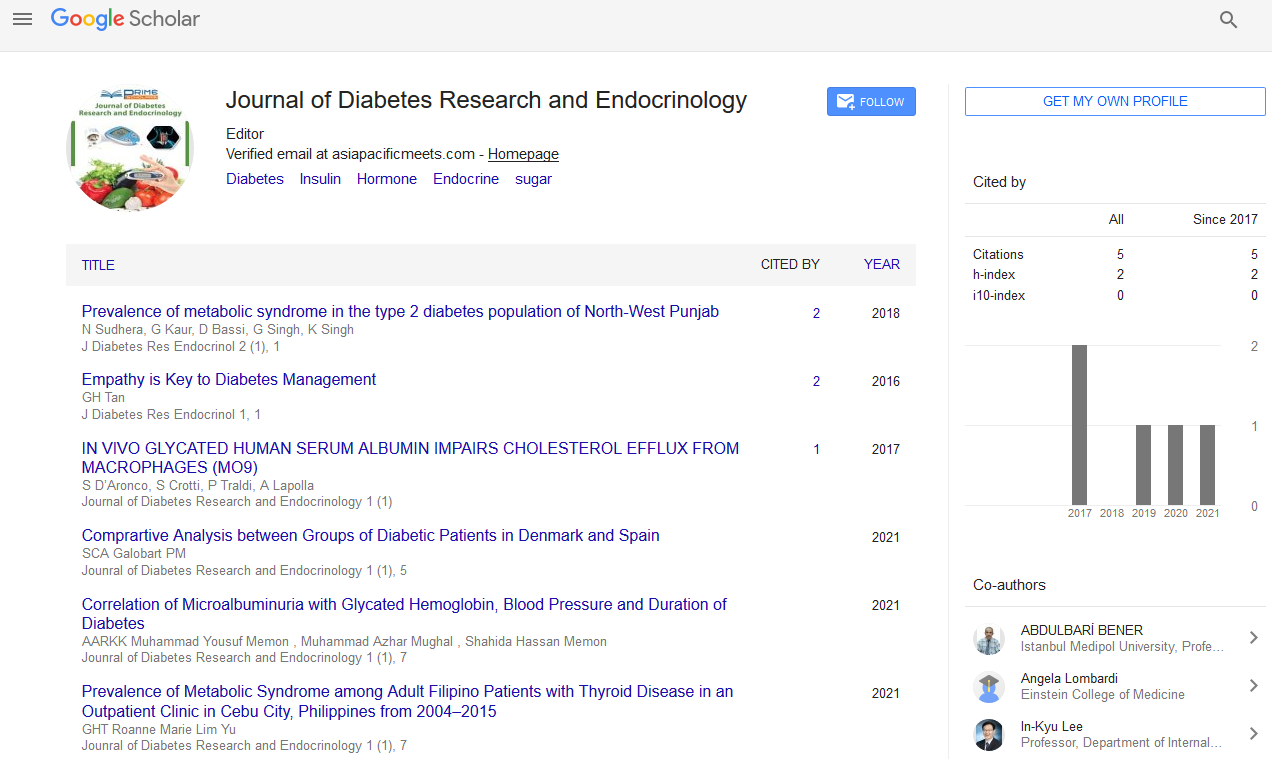Commentary Article - (2022) Volume 6, Issue 1
Short Notes on Diabetes Complications and Risk Factors
1Department of Diabetology, Jawaharlal Nehru University, India
*Correspondence:
Vaishali Gupte, Department of Diabetology, Jawaharlal Nehru University,
India,
Email:
Received: 03-Jan-2022, Manuscript No. IPJDRE-22-12592;
Editor assigned: 05-Jan-2022, Pre QC No. IPJDRE-22-12592(PQ);
Reviewed: 19-Jan-2022, QC No. IPJDRE-22-12592;
Revised: 24-Jan-2022, Manuscript No. IPJDRE-22-12592(R);
Published:
31-Jan-2022, DOI: 0.36648/09768610.6.1.9
Description
Diabetes develops when ones body’s cells are unable to absorb sugar (glucose) and uses that for energy. As just a result, extra sugar accumulates in your bloodstream. Diabetes that is poorly managed can also have severe repercussions, causing damage to a variety of organs and tissues in one’s body, including their heart, kidneys, eyes, as well as nerves. Digestion is the process of breaking down the food you eat into various nutrient sources. When individuals eat carbohydrates (such as bread, rice, or pasta), your body converts them into sugar (glucose). When glucose enters ones bloodstream, it requires assistance – a “key” – to reach its final destination, which is inside their body’s cells (cells comprise your body’s tissues and organs). Insulin is the “help” or “key” to this organ. Insulin is a hormone produced by the pancreas, which would be located behind the stomach. Insulin is released into your bloodstream by their pancreas. Insulin functions as the “key” that unlocks the cell wall “door,” allowing glucose to be taken the cells of your body. Glucose provides the “fuel” or energy that tissues and organs require to function properly
Complications and Risk Factors: properties Coronary artery disease, difficulty breathing, heart attack, stroke, hypertension, high cholesterol, and atherosclerosis are all examples of cardiovascular problems (narrowing of the arteries).
Nerve damage (neuropathy) causes numbness and tingling which begins in the toes or fingertips and spreads. Nephropathy is renal damage that can lead to kidney failure, dialysis, or transplantation. Cataracts and glaucoma are examples of eye damage (retinopathy) that can lead to blindness. Foot damage can cause nerve damage, poor blood flow, and slow wound and sore healing.
Diabetes complications during pregnancy: Preeclampsia (hypertension, excess protein in urine, leg/feet swelling), risk of gestational diabetes in subsequent pregnancies, and risk of diabetes later in life inside the mother, High birth weight, low blood sugar (hypoglycemia), increased risk of developing Type 2 diabetes placed above a white time, and death right after birth in newborns.
Having a Type 1 diabetes family history (parent or sibling), Pancreatitis is a type of pancreatitis (such as by infection, tumor, surgery or accident), Autoimmune reactions (antibodies that mistakenly attack ones possess body’s tissues or organs) are prevalent. Physical tension (such as surgery or illness), Exposure to viruses-caused illnesses.
A family history of prediabetes or Type 2 diabetes (parent or sibling), Being black, Hispanic, Native American, Asian-American, or Pacific Islander, Being excessively fat, Having a very high blood pressure reading, Having low HDL (the “good” cholesterol) and a high triglyceride level, Being physically sedentary, Being 45 years of age or older, Having gestational diabetes or having a baby that weighs more than 9 pounds, Possessing polycystic ovary syndrome, Having a family history of cardiovascular disease or stroke, Being a cigarette smoker.
Diabetes increases your chances of contracting certain diseases. Vaccines given on a regular basis can help prevent them. Inquire with ones doctor about the flu vaccine. A yearly flu vaccine can result in healthy during flu season and prevent serious flu complications, Vaccination against pneumonia. In some cases, the pneumonia vaccine only requires one shot. A booster shot may be required if diabetes complications or are 65 or older, Vaccine against Hepatitis B. Adults with diabetes who have not previously received the vaccine and are under the age of 60 are advised to get the hepatitis B vaccine. If you’re 60 or older and have never received the hepatitis B vaccine, consult a doctor about whether it’s a good idea for oneself.
Acknowledgement
None.
Conflict of Interest
We have no conflict of interests to disclose and the manuscript
has been read and approved by all named authors.
Copyright: This is an open access article distributed under the terms of the Creative Commons Attribution License, which permits unrestricted use, distribution, and reproduction in any medium, provided the original work is properly cited.

